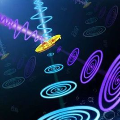Visualizations have played a crucial role in helping quantum computing users explore quantum states in various quantum computing applications. Among them, Bloch Sphere is the widely-used visualization for showing quantum states, which leverages angles to represent quantum amplitudes. However, it cannot support the visualization of quantum entanglement and superposition, the two essential properties of quantum computing. To address this issue, we propose VENUS, a novel visualization for quantum state representation. By explicitly correlating 2D geometric shapes based on the math foundation of quantum computing characteristics, VENUS effectively represents quantum amplitudes of both the single qubit and two qubits for quantum entanglement. Also, we use multiple coordinated semicircles to naturally encode probability distribution, making the quantum superposition intuitive to analyze. We conducted two well-designed case studies and an in-depth expert interview to evaluate the usefulness and effectiveness of VENUS. The result shows that VENUS can effectively facilitate the exploration of quantum states for the single qubit and two qubits.
翻译:可视化在帮助量子计算用户探索各种量子计算应用程序中的量子状态方面发挥了至关重要的作用。其中,布洛赫球是最广泛使用的可视化,用角度表示量子幅度。然而,它无法支持量子纠缠和叠加的可视化,这是量子计算的两个基本属性。为了解决这个问题,我们提出了Venus,一种用于量子状态表示的新颖可视化。通过显式地相关联的二维几何形状,基于量子计算特征的数学基础,VENUS有效地表示了单个量子位和两个量子位的量子幅度以实现量子纠缠。此外,我们使用多个协调的半圆圈自然地编码概率分布,使量子叠加可以直观地分析。我们进行了两项精心设计的案例研究和深入的专家访谈,以评估Venus的实用性和有效性。结果表明,Venus可以有效地促进单个量子位和两个量子位的量子状态的探索。


